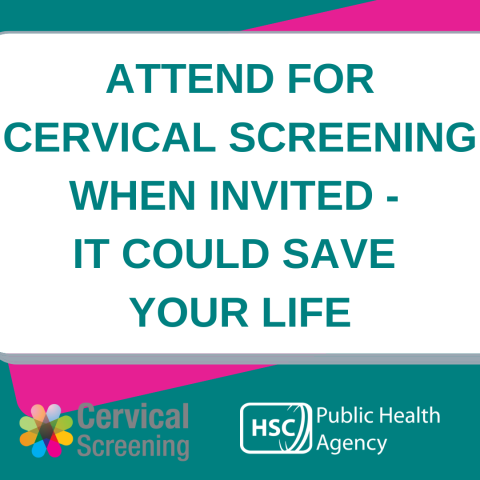Cervical screening saves lives

The Public Health Agency (PHA) is emphasising how important and effective the cervical screening programme is in preventing cancer.
Dr Bríd Farrell, Deputy Director of Public Health at the PHA, said: “Since the cervical screening programme was first introduced in Northern Ireland in 1988, many lives have been saved. Cervical cancer is one of the few cancers that can be prevented thanks to screening. It is estimated that in a well-screened population, eight out of ten cervical cancers can be prevented. I urge everyone who receives an invitation for screening to attend for their smear test.
“Cervical cancer screening here has proven to be very effective at preventing cancer and saving lives, and will continue to do so if those who are eligible attend for screening when invited.
“About 110,000 cervical screening tests are carried out each year in Northern Ireland. There is constant audit, quality assurance and monitoring of results to make sure the programme continues to perform to national standards, and this involves all parts of the screening pathway – not just the laboratory process.
“In Northern Ireland, cervical screening is available to women and people with a cervix aged 25-64. This is the age group where screening is of most benefit. Screening is offered every three years for the 25-49 age bracket, and every five years for 50-64 year olds. Around 70% of those invited do come forward for their smears, but we would encourage everyone to come forward when invited as those who don’t may miss out on the chance of early changes being detected.
“When you receive an invitation for cervical screening, it is really important to attend. Cervical screening aims to prevent cervical cancer from developing. It’s often called a ‘smear test’ and checks the cells from your cervix, the lower part of the womb. The cells are checked for pre-cancerous changes which can be treated therefore avoiding the changes going onto become cancerous. Attending for cervical screening could save your life.
“Globally, cervical cancer is the fourth most common cancer in women, but thanks to the screening programme in Northern Ireland, which aims to prevent cancer before it develops, here it is the 12th most common cancer in women.
“Northern Ireland has an excellent cervical screening programme. The effectiveness of the programme here is also reflected in cervical cancer case data, with 8.8 cases/100,000 person years in Northern Ireland compared with 11.35 cases/100,000 in the Republic of Ireland and a global average of 13.3 cases/100,000.”
Samantha Dixon, Chief Executive of Jo’s Cervical Cancer Trust, added: “Cervical screening can stop cervical cancer before it starts so it’s an important test and I would urge everyone who is invited for screening to attend. It’s not always the easiest test, and if you have questions or concerns, or need support with your results, then we’re here for you.”
Screening rather than diagnosis
Dr Bríd Farrell continued: “It is important to note that cervical screening does not provide cancer diagnosis, but is aimed at detecting changes to cells in the cervix which, without treatment, can sometimes develop into cancer.
“In a very small number of cases, a cancer could develop between screening tests, or there is a small chance that the test does not identify some early cell changes to the cervix. In all cases of cervical cancer, a review of that person’s screening history and previous tests or treatments will take place to determine how well each step in the screening process worked, and if there are any areas where improvements could be made. Since 2019 a comprehensive policy has been in place for patients to be informed of this process, and they can receive the results of the review if they wish.
“The PHA has been assured that all trusts have operationalised the framework guidance that was issued in 2019. It is important to recognise that the timing of disclosure will be dependent on an individual person’s cancer treatment journey and personal choice. An information leaflet on the audit process is available to trusts and is intended to be provided to all patients at the time of a diagnosis of cervical cancer. Individuals will be directly written to by the trust if a disclosure meeting is advised, but it is important to recognise personal choice in this process, as many will choose not to know the outcome.
“No matter what age you are and even if you have had a normal screening test, you should speak to someone at your GP surgery if you have any symptoms such as vaginal bleeding after sex, between periods or after the menopause, or vaginal discharge that is not normal for you; or persistent back or tummy pains, or pain during sex.”
